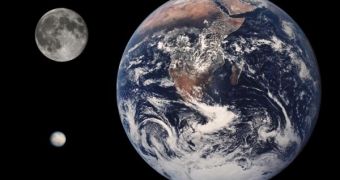At the International Society for the Study of the Origin of Life conference, which took place in Florence, Italy, an astronomer proposed a somewhat unusual location of where life might have originated from. University of Giessen scientist Joop Houtkooper told colleagues and attendants that life on Earth might have reached our planet after leaving the dwarf planet Ceres, which currently orbits the Sun beyond Mars. The idea was highly unexpected, and most of the scientists in Florence didn't know how to react.
“This idea came to me when I heard a talk about all the satellites in the solar system that consist of a large part of ice, much of which is probably still in a liquid state. The total volume of all this water is something like 40 times greater than all the oceans on Earth,” Houtkooper explained. According to the latest classifications from the International Astronomical Union (IAU), the celestial body is now a dwarf planet. Upon its discovery in 1801, it was called a planet, but was later “downgraded” to a mere asteroid.
“If life is not unique to the Earth and could exist elsewhere, then these icy bodies are the places where life may have originated,” the scientist continued his idea. And his thought may not be so far-fetched as some may be tempted to think. Evolution theorists say that life on Earth may have first appeared around hydrothermal vents, the places on the bottom of the oceans where various gases from the planet's crust are thrown out. In those violent conditions, microbes still manage to endure.
“The evidence points to Ceres having remained relatively unscathed during the Late Heavy Bombardment,” he pointed out, referring to the last period in which planets in the solar system came under heavy “attacks” from many asteroids, comets, and other wandering bodies. He believed that the dwarf planet behind Mars might still have “a water ocean where life could have originated early in the history of the solar system.”
“I looked at the different solar system bodies which either had or currently have oceans. The planet Venus probably had an ocean early in its history, but the planet's greater mass means that more force is needed to chip off a piece of the planetary crust and propel it in the direction of the Earth. Smaller objects like Ceres have lower escape velocities, making it easier for parts of it to be separated,” he shared.
Fortunately, we will not have to wait long until we figure out if the scientist is right in his assumption or not. NASA's Dawn spacecraft just recently completed its Mars-assist stage, and is now heading towards Ceres and the asteroid Vesta, which it will study between 2011 and 2015.

 14 DAY TRIAL //
14 DAY TRIAL //